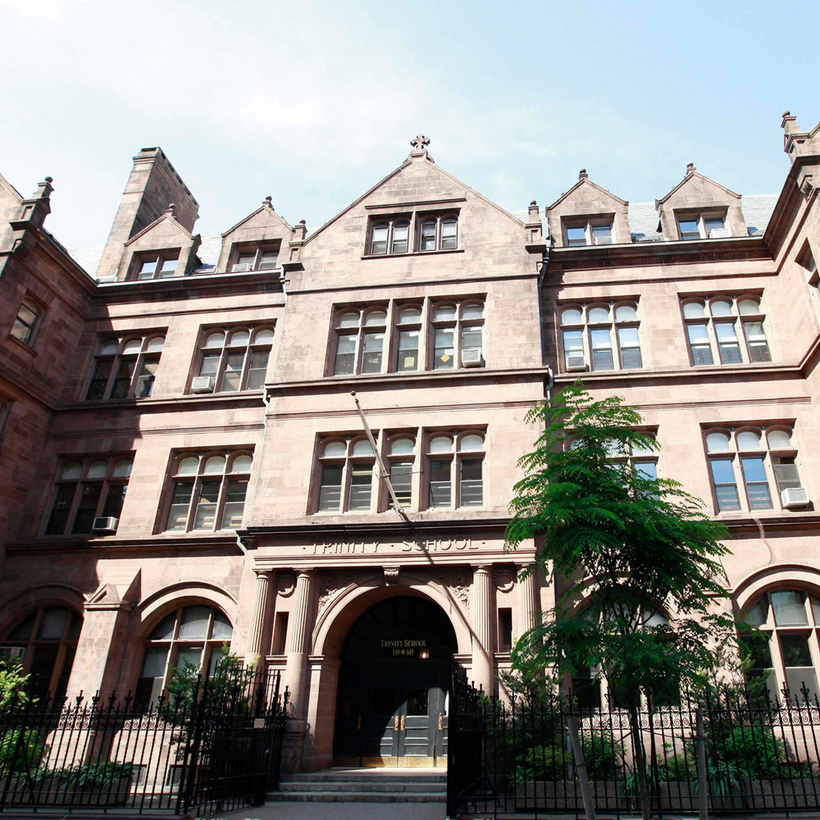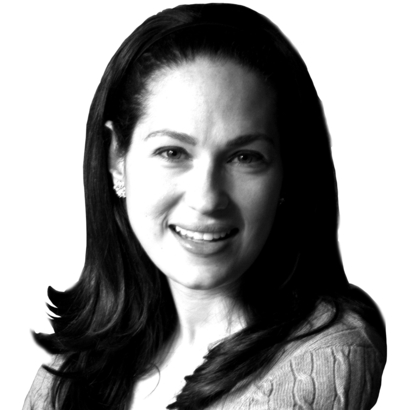In New York, the stakes of getting one’s child into private school seem to be so high that not long ago a couple reportedly enlisted the Dalai Lama to write a letter of recommendation. So, what happens when the raisons d’être of elite prep schools—the in-person networking with future Masters of the Universe, the small classes and personalized attention, the swimming pools, the squash courts (Spence is planning to build nine of them in their new recreational facility), and the state-of-the-art science labs—suddenly disappear?
Among the many seismic societal changes that the coronavirus has wrought is the total disruption of the American educational system. And for a certain group of well-heeled New York City parents who have the incredibly good fortune of health, safety, and large country estates, the question is “Why am I paying $50,000 a year for mediocre Zoom classes that I have to supervise?”
Education on Rotation
The Trinity School, the rigorous Upper West Side K–12 institution, recently held a virtual meeting about its reopening plan. Their proposal sounded similar to those rumored at other schools. Get ready to start back in September remotely, children, before eventually adopting a hybrid rotation, three days in a real classroom, two by Zoom, when the timing is right.
The Trinity meeting was aptly timed—right around when many schools ask for another installment of the next year’s tuition. One Trinity parent told me the new quid pro quo is: “Show me a reopening plan, and I’ll write a check.”
“Naturally, some parents are saying they didn’t pay $55,000 a year to go to math class online,” says Amanda Uhry, founder of Manhattan Private School Advisors, who works with 1,600 parents a year to coach them on how to gain admission to a private school. Thirty-five parents, Uhry says, have called her seeking guidance about getting a refund for what they perceive to be an ersatz version of learning. She added, “Private-school parents think they are very special, so they are upset that their kid isn’t getting special attention online.”
“Show me a reopening plan, and I’ll write a check.”
To that point, one New York City private-school mother told me she knows parents who are demanding extra math time and FaceTime office hours. “What is this, college?” she said.
Alternative Arrangements
So, if you’re going to spend an egregious amount of money on distance learning, why not do it from the comfort of your own spacious home somewhere that it doesn’t snow in May and the beaches are pleasant? In fact, why even come back to Manhattan if there is no end in sight—a vaccine—to the current global pandemic?
“Some think it’s great that they can be at their summer house in Maine and still get a degree from Collegiate,” said Alina Adams, who runs the Web site NYC School Secrets. A Palm Beach real-estate agency with an elite clientele told “Page Six” the market has been very active for house-hunters with school-age children. Avenues: The World School, the for-profit school reportedly attended by Siri Cruise, has plans to open up a campus in the Hamptons.
One Manhattan family has recently vacated their rental apartment on lower Fifth Avenue, and they plan to pull their first-grader from his progressive private school and instead cobble together a group of kids to be taught in person by a tutor next year. “Read the science,” says the mother, who is a high-powered consultant. “The virus transmits most easily in crowded spaces with poor ventilation. Until there’s a vaccine, it’s not worth the risk.”
Other parents, particularly for whom private-school tuition is not a rounding error, are throwing in the (expensive) towel and opting for public school. Adams, whose consulting practice helps families navigate private- and public-school options, says this category consists mostly of families that find $50,000 a year to be a stretch and whose child tested into New York City’s Gifted & Talented program.
“Some think it’s great that they can be at their summer house in Maine and still get a degree from Collegiate.”
But if you were thinking there’s a potential silver lining that a private-school exodus might help revitalize the New York City public-school system, think again. “If suddenly 10 families enter a public school, it’s not like the teaching quality is going to immediately transform. The best these families can probably do for these schools is a new coat of paint, and they have to go through so much bureaucracy even to do that,” said Adams. And the more than half a billion dollars in budget cuts planned for New York City’s Department of Education certainly won’t help bolster public schools.
Uhry, whose consulting fee ranges from $15,500 to $35,000 per family, is unequivocal on this matter: “Rich people aren’t going to send their kids to P.S. 6.” What rich people will do, however, is pay tuition to not send their kids to school. Yes, you read that correctly. Adams says she knows parents who are paying to hold their spots at top-tier New York City private schools but don’t want their children to attend “Zoom school.” (Who does, really?) These parents find that either their children can’t focus or that the amount of time and energy it takes to supervise them is torturous. So, why not treat yourself—and your child—to a sabbatical from second grade and avoid having to re-apply to private school when you return from the Hamptons or California in 2022? In the meantime, surely a private tutor can pinch-hit?
Similar to the dynamics in the rest of society, those in the 1 percent will be fine. Uhry predicts Trinity will see a zero percent attrition rate. Even if parents are kvetching, she’s telling them: “Don’t rock the boat. These schools have a waiting list as long as the phone book, and they don’t care if you want to pull your child out. Parents would still give their last dollar to go to Trinity or Collegiate.”
Adams says it’s the second tier of private schools—Hewitt, Bank Street, Allen-Stevenson, and Manhattan Country—who are seeing the most attrition. She predicts the winners may actually be the current underdogs: small private schools such as Wetherby-Pembridge and the International Academy of New York because they already have small classes that will make social distancing more feasible.
Parents in Crisis
In the meantime, parents, particularly those with elementary-school-age children, aren’t thrilled with the status quo. (Who wants—or has time—to find 40 pennies for a math exercise?)
One Upper East Side mother who has a child starting kindergarten in the fall at Trinity says parents have been trying to “nickel-and-dime” the approximately $35,000-a-year pre-school her daughter (virtually) attends. She says parents are asking the school to “pro-rate tuition” even though distance-learning classes are continuing. “They are saying Zoom class with 25 kids is not personal enough,” she said.
Distance learning, it turns out, magnifies the difference between kids who are self-motivated and able to focus and those who need more oversight. One quirk of the remote classroom means there is actually a lot less time in class. A Trinity Upper School parent observed that the new educational regime requires more “executive functioning and planning ahead.” While she says her child is adapting well—being able to start school at 10 a.m. is one perk—others find it quite difficult.
“The parents who are complaining are the ones who were having trouble before all of this getting their kids to focus on their schoolwork, and now it’s much worse,” she said, adding, “I have a lot of sympathy for these private schools. They don’t print money. They are doing the best they can. Instead of asking for a refund, people should be asking what kind of committee they can join to make distance learning better for everyone.”
That is certainly a nice sentiment, but perhaps not the immediate instinct for a group of people who feel entitled to life being on their terms.
“This Is All Such a Gamble”
One father, who attended private school in New York City and who now has two sons at a prestigious all-boys school in Manhattan, says he joked about asking for a refund but is seriously pondering what to do in September: “Are we really going to pay $55,000 for online learning when so much of the school experience is about the ability to interact with your peers?”
He says one factor that could drive him to take his children out of private school would be the chance of getting back to some kind of normalcy faster in another place. “I’ve been hearing discussions of a hybrid model where half the students come back every other day. If you are in Rye or Greenwich, they have more space, and it will be easier to do that,” he surmised.
“Are we really going to pay $55,000 for online learning when so much of the school experience is about the ability to interact with your peers?”
One Greenwich Village family with a young son who currently attends an elite boys’ school have applied to several private and public institutions in the Hamptons. They will lose a four-figure deposit, says the mother, but the possibility of sending her son to a physical campus where he will benefit from real interactions with teachers and peers is worth it. On Wednesday, The Wall Street Journal reported that the Ross School, a private institution in East Hampton, has received around 65 new applications this spring to its lower school for the 2020–21 school year.
“The value proposition [of New York private schools] is no longer there,” she says. “As much as we love our son’s school, the virtual version is a joke. It’s two hours a day of chaotic Zoom calls and YouTube videos. He’s regressing in behavior, writing, and even reading. We can deal with distance learning for a few months, but in the long term it doesn’t seem healthy. It makes so much more sense to pursue a real school experience, if only for a year. But who knows if the Hamptons schools will be physically open in the fall? This is all such a gamble.”
The mother of the incoming Trinity kindergartner says she is taking the long view and has no qualms about writing a $54,540 tuition check, even if her child doesn’t see the inside of the 91st Street campus until 2022. Her reason is what anyone paying that much for kindergarten is thinking: “This is an investment in your kid’s network,” she says.
And therein lies the rub. Distance learning has cracked open the real reason New York City parents spend staggering amounts of money to educate their children. It’s not just to learn physics, or French, or history; it’s for the culture and camaraderie of the institution. It’s the physical experience of, say, shaking hands with the principal (a Collegiate tradition) every morning and learning the social codes and cues of blueblood manners and etiquette. Zoom school certainly can’t replicate those experiences or even provide meaningful ways to develop emotional intelligence. Still, New York City is fundamentally a metropolis of strivers who are constantly chasing “the best” for their children. Which is why so many tuition checks for next year are surely in the mail.
Hannah Seligson is a writer based in New York


